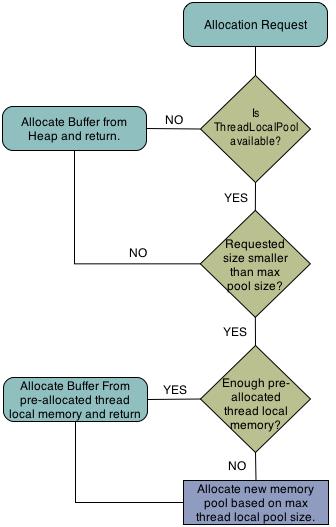Memory Management Overview
Grizzly 2.0 introduces a new subsystem to improve memory management within the runtime. This subsystem is comprised of three main artifacts:
-
Buffers
-
Thread local memory pools
-
MemoryManager as a factory of sorts using the buffers and thread local pools
whose primary purpose is to speed up memory allocation and, when possible, provide for memory re-use.
The following sections will describe these concepts in detail.
MemoryManager
The MemoryManager is the main interface for allocating/de-allocating Buffer instances:
public interface MemoryManager<E extends Buffer>
extends JmxMonitoringAware<MemoryProbe> {
/**
* Allocated {@link Buffer} of the required size.
*
* @param size {@link Buffer} size to be allocated.
* @return allocated {@link Buffer}.
*/
public E allocate(int size);
/**
* Allocated {@link Buffer} at least of the provided size.
* This could be useful for use cases like Socket.read(...), where
* we're not sure how many bytes are available, but want to read as
* much as possible.
*
* @param size the min {@link Buffer} size to be allocated.
* @return allocated {@link Buffer}.
*/
public E allocateAtLeast(int size);
/**
* Reallocate {@link Buffer} to a required size.
* Implementation may choose the way, how reallocation could be done, either
* by allocating new {@link Buffer} of required size and copying old
* {@link Buffer} content there, or perform more complex logic related to
* memory pooling etc.
*
* @param oldBuffer old {@link Buffer} to be reallocated.
* @param newSize new {@link Buffer} required size.
* @return reallocated {@link Buffer}.
*/
public E reallocate(E oldBuffer, int newSize);
/**
* Release {@link Buffer}.
* Implementation may ignore releasing and let JVM Garbage collector to take
* care about the {@link Buffer}, or return {@link Buffer} to pool, in case
* of more complex <tt>MemoryManager</tt> implementation.
*
* @param buffer {@link Buffer} to be released.
*/
public void release(E buffer);
/**
* Return <tt>true</tt> if next {@link #allocate(int)} or {@link #allocateAtLeast(int)} call,
* made in the current thread for the given memory size, going to return a {@link Buffer} based
* on direct {@link java.nio.ByteBuffer}, or <tt>false</tt> otherwise.
*
* @param size
* @return
*/
public boolean willAllocateDirect(int size);
}
There is typically a single MemoryManager servicing all transports defined within the Grizzly runtime. This MemoryManager can be obtained by referencing the static member of the MemoryManager interface:
MemoryManager.DEFAULT_MEMORY_MANAGER
Conversely, custom MemoryManager implementations may be made as the default MemoryManager by defining the system property org.glassfish.grizzly.DEFAULT_MEMORY_MANAGER that references the fully qualified class name of the MemoryManager implementation to use. Note that this implementation must have a public no-arg constructor in order for the runtime to properly set the new default.
Grizzly 2.3 includes two MemoryManager implementations: HeapMemoryManager and ByteBufferManager. By default, the Grizzly runtime will use the HeapMemoryManager, however if a Grizzly application requires direct ByteBuffer access, then the ByteBufferManager can be used.
ByteBufferManager
The ByteBufferManager implementation vends Grizzly Buffer instances that wrap JDK ByteBuffer instances. This is the MemoryManager to use if the Grizzly application requires direct ByteBuffer usage.
It should be noted that this MemoryManager, during our benchmarking, showed to have a little more overhead when using typical heap buffers. As such, if direct memory isn’t needed, we recommend that the default HeapMemoryManager be used.
HeapMemoryManager
The HeapMemoryManager is the default MemoryManager. Instead of wrapping ByteBuffer instances, this MemoryManager will allocate Buffer instances that wrap byte arrays directly. This MemoryManager offers better performance characteristics for operations such as trimming or splitting.
ThreadLocal Memory Pools
ThreadLocal memory pools provide the ability to allocate memory without any synchronization costs. Both the ByteBufferManager and HeapMemoryManager use such pools. Note that it’s not required that a custom MemoryManager use such pools, however, if said MemoryManager implements the ThreadLocalPoolProvider interface, then a ThreadLocalPool implementation must be provided. The ThreadLocalPool implementation will be created and passed to each thread being maintained by Grizzly’s managed threads.
Memory Manager and ThreadLocal Memory Pools Working Together
The following provides a flow diagram of how an allocation request to a MemoryManager with a ThreadLocalPool would typically work:

Buffers
Grizzly 2.3 provides several buffers for developers to leverage when creating applications. These Buffer implementations offer features not available when using the JDK’s ByteBuffer.
Buffer
The Buffer is essentially the analogue to the JDK’s ByteBuffer. It offers the same set of methods for:
-
Pushing/pulling data to/from the Buffer.
-
Methods for accessing or manipulating the Buffer’s position, limit, and capacity.
In addition to offering familiar semantics to ByteBuffer, the following features are available:
-
Splitting, trimming, and shrinking.
-
Prepending another Buffer’s content to the current Buffer.
-
Converting the Buffer to a ByteBuffer or ByteBuffer[].
-
Converting Buffer content to a String.
Please see the javadocs for further details on Buffer.
CompositeBuffer
The CompositeBuffer is another Buffer implementation which allows appending of Buffer instances. The CompositeBuffer maintains a virtual position, limit, and capacity based on the Buffers that have been appended and can be treated as a simple Buffer instance.
Please see the javadocs for further details on CompositeBuffer.
